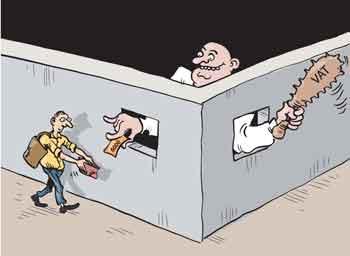Reply To:
Name - Reply Comment
 Parliament sessions on Sunday had to be adjourned for Monday for want of quorum, while the Value Added Tax (VAT) Amendment Bill was being debated. Interestingly, only 18 out of 225 members elected by the people to represent them were present at the time of adjournment, even after the quorum bell was rung. 207 members had absented themselves. Parliamentary quorum is just 20 members.
Parliament sessions on Sunday had to be adjourned for Monday for want of quorum, while the Value Added Tax (VAT) Amendment Bill was being debated. Interestingly, only 18 out of 225 members elected by the people to represent them were present at the time of adjournment, even after the quorum bell was rung. 207 members had absented themselves. Parliamentary quorum is just 20 members.
The VAT Amendment Bill that was to be passed on Sunday is meant for removing the exemption of VAT from 97 items, while increasing the tax to 18 percent from the current 15 percent. The Opposition members argued that many of the 97 items on which VAT is to be imposed anew from January 1 are essentials for the poor and the farmers who had suffered by the recent import ban on fertilizer. They rightly pointed out that the VAT on these items will increase from zero percent to 18 percent.
Based on this stance, they contended at a press briefing later on Sunday that they scuttled the passage of the Bill by raising the quorum issue. However, the absurdity of the contention was evident immediately as it was clear that the government would pass the Bill at the first moment it gets the opportunity. They also stated that the lack of quorum was an indication that the members of the ruling party were opposed to the Bill, another argument that was destined to be short-lived. It was self-deceptive if they really meant it and an attempt to deceive the people if they didn’t.
However, maintaining the quorum is primarily the responsibility of the ruling party, as the Opposition would always attempt to scuttle government activities in the House, sometimes taking advantage of technical situations such as the poor attendance by the members.
Yet, that would only be justifiable if the Opposition genuinely believes that the government’s action which they are going to defeat is really detrimental to the interests of the masses. What happens on the ground with regard to the proceedings of the House is that the Opposition, whether it is the SJB or the UNP or the SLPP, would oppose anything that is presented by the government, except for those motions for the increase of their salaries and perks.
Nevertheless, lack of quorum on Sunday seems to be lack of interest on the part of the MPs of all parties in participating in the proceedings of the House, and has nothing to do with the merit or demerit of the Bill. This situation is not unfamiliar as far as the Sri Lankan Parliament is concerned. In most cases when House business is carried out without the quorum nobody would make it an issue. This had happened during budget debates as well, in the past.
Except for the budget period, Parliament is convened only for eight days a month. The members are maintained sumptuously by the public coffers for this purpose. Besides, they automatically earn a social status the moment they are elected to Parliament and that places them above the people and sometimes above the law and paves the way for money making. Apart from this, it is said that the Parliament spends over Rs. 4.5 million for a day’s session. Hence, failing to attend the sessions amounts to a breach of the
people’s trust.
Veteran politician of the Communist Party and former Chairman of the Committee on Public Enterprises (COPE), D.E.W. Gunasekara, on the eve of the last Parliamentary Election, listed four qualifications that the people’s representatives must possess. They must be able to contribute to make laws, make policies, supervise public finance and represent the people, he argued. Leave alone these qualifications; they must at least attend
the meetings.
As the saying goes, the God will not change the destiny of the people until they change themselves. Hence, the onus is on the people to elect their representatives on the basis of competency and integrity, and not of ethnicity, religion, caste, muscle power, wealth or celebrity status. The voters must realize the fact that they have already paid a heavy price by ruining their future and that of their children by failing in this respect in the past.